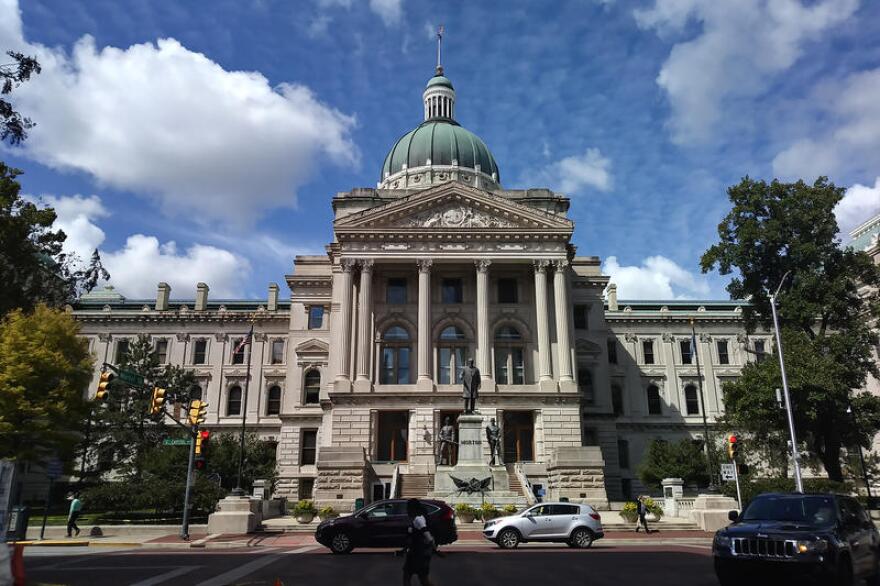Most of the nearly 300 new laws crafted by the General Assembly this year take effect Monday.
That includes a new state spending plan, child welfare measures, scooter regulations and criminal justice matters.
State Budget
The new two-year, $34 billion state budget largely goes into effect July 1. The majority of that is K-12 education, which received a more than $500 million increase. And the Department of Child Services will get a little less money than it’s been working with.
Department of Child Services
In addition to a budget shift, DCS will also undergo statutory changes. Caseworkers will now have more time for initial assessments when a child is reported in danger. And the way their caseloads are counted will change, making it easier to meet required levels. DCS will also have to adjust how it deals with foster parents, giving them a bigger role in long-term child welfare cases.
Electric Scooters
And a new law this year imposes some minimum regulations for electric scooters. It largely leaves the issue up to local government – but communities aren’t allowed to ban them entirely.
Revenge Porn
People who share an intimate photo or video of someone without their permission – sometimes called “revenge porn” – will now be subject to legal penalties. Those offenders could pay thousands of dollars in civil court and face a misdemeanor for the first offense and a felony for multiple convictions.
Fertility Fraud
The case of an Indianapolis fertility doctor who used his own sperm to father dozens of children without his patients’ knowledge spurred a new law that would impose criminal and civil penalties on other such violators.
Jail Overcrowding
And some Level 6 felons could now go to state prisons rather than county jails or community corrections programs. The measure – meant as a way to help ease jail overcrowding – would allow judges to send Level 6 offenders to prison if they committed a violent crime or if they have two, previous, unrelated felony convictions.
Abortion Ethical Exemptions
A bill allowing pharmacists to refuse to dispense abortion-inducing drugs goes into effect.
Previously, doctors and hospital employees could refuse to participate in abortion procedures for religious, ethical or moral reasons. The new law extends that to pharmacists, nurses, and physician assistants.
School Bus Safety
Indiana drivers who recklessly pass school buses when the stop arm is out now face increased penalties under a new law. It also gives schools a way to pay for cameras on school buses.
An accident last year in Rochester, Indiana, that killed three children prompted the legislation. Drivers who illegally pass a bus and injure or kill someone will now be committing a felony, instead of a misdemeanor.
Radon Testing In Schools
Radon is a naturally-occurring, odorless gas that seeps into buildings from the soil. Exposure to radon is the leading cause of lung cancer in people who don’t smoke in the U.S. It’s estimated to cause more than 21,000 deaths every year.
The bipartisan bill now requires the Indiana State Department of Health to recommend schools test for radon, though it wouldn’t make testing mandatory. Day cares also aren't required to test of the gas.
Volunteer Coach Discipline
A new Indiana law now offers guidelines for how volunteer coaches at high schools are disciplined.
State law already governs how coaches who are employees of a high school are treated when fired for criminal acts or misconduct. But the law didn’t contemplate volunteers.
The bill applies to public, charter and private schools.
Workforce Diploma Reimbursement
A new law will fund adult high school diploma programs based on performance – not just enrollment. The requirements will affect programs across the state.
The new law establishes the Workforce Diploma Reimbursement Fund. It lets programs that award adult high school diplomas apply for a reimbursement of up to $6,750 per graduate. To be reimbursed, the programs must also maintain a graduation rate of at least 50 percent, among other requirements.
Pregnancy Care For Minors
A new law now allows 16- and 17-year-olds to make their own decisions about pregnancy care.
Indiana law generally doesn’t let minors make their own health care decisions without a parent’s consent. That includes 16- and 17-year-olds who are pregnant.
The law requires physicians to try to contact the pregnant teen’s parents.
Nurse Licensure Compact
Indiana joins 31 other states in a nurse licensure compact. The new law could improve access to care in rural parts of the state.
Nurses in Indiana will be able to work in other states that are part of the compact and vice versa. In emergencies, like flooding, nurses in the compact can respond in neighboring states. Currently Kentucky is the only other border state in the agreement.



